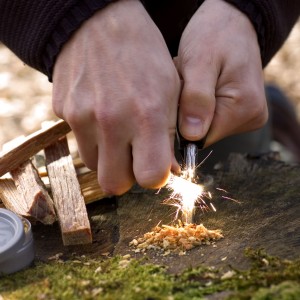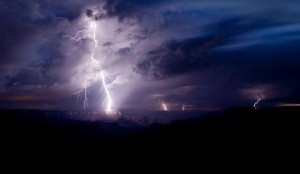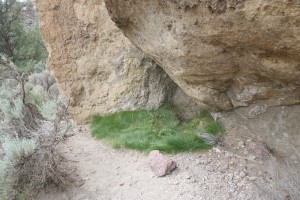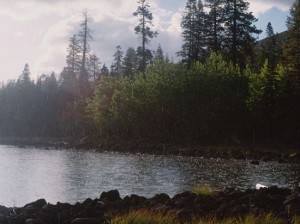Ten Things I Learned in the Wilderness
The wilderness is a teacher, and it teaches, often implacably, the natural consequences of our actions. It’s simple: if I haven’t set up a shelter and it rains, then I get wet. But the lessons of the wilderness go much deeper than that. Kierkegaard once wrote that his foundational idea was that “that those of our time, because of so much knowledge, have forgotten what it is to exist, and the meaning of inwardness.” The problem, he said, is that we have “forgotten what it means to exist humanly.” In just that way, the wilderness teaches how to exist humanly — remembering what is important, in right relationship, in touch with meaning in the world. Here are ten such lessons that the wilderness has taught me.
 |
| Things take time |
1. Things take time. It takes time to do things right in the wilderness — to build a fire, find a good place to camp, put up a shelter that won’t blow away in the wind. Taking time evolves naturally into a kind of grace, a sort of unhurried care, a patient mindfulness. Doing things right, unhurriedly and mindfully, turns the most mundane of necessary tasks into a form of meditation.
2. Life is maintenance. Because things take time and care and patience, we find ourselves spending much of our time in the wilderness doing the most basic human activities — finding and preparing food, securing shelter, observing our environment. The seventeenth-century painter and poet Wu Li once said, Before enlightenment, chop wood, carry water; after enlightenment, chop wood, carry water. We tend to disparage our ordinary everyday tasks, chopping wood and carrying water, but in the wilderness those tasks become vitally important, essential to survival, and therefore filled with meaning.
 |
| Life is fragile |
3. Community feeds us. Sometimes it is only when we are alone in the wilderness that we most learn the value of community. Though we may treasure our solitude, we ultimately yearn to meet our friends again at the trailhead. And when we are in the wilderness with others, survival may demand that we learn to value the contribution of each, to appreciate the unique skills and qualities of the companions to whom we have entrusted our safety and our lives. Human community began when we foraged as small bands in the wilderness, dependent on each other, and the wilderness can bring us back to our deepest human roots.
4. Life is fragile. The wilderness reveals our vulnerabilities. In a thunder storm, you can feel the lightning strike the ground through the soles of your boots. We can slip and fall, become sick, be swept away by the current. We are far from help, and we have to rely on our own resources if we are hurt. It seems that only after a close call in the wilderness do we truly appreciate the feel of our breath moving in and out, grateful to be on the right side of the grass. We need, from time to time, to reflect on the gifts we have been given.
 |
| The world is meaningful |
5. The world is meaningful. Green grass in an arid area tells us where to find water. Clouds in the sky tell us whether it will rain. The sun gives the direction in which to walk. A rattlesnake warns us to stay away. These are simple, basic ways in which the world speaks to us, and we listen carefully, because our survival depends on it. How the wilderness speaks to us is in signs and metaphors — clouds for rain, green grass for water, the tenacity of a bug on a leaf, the patience of a spider, the playfulness of a raven. We learn to listen to the quiet whispers that give meaning to the world.
6. Everything is related. In the wilderness you can feel the energy pouring down from the sun onto the land and into your body. You can watch the green plants that reach for the sunlight, the animals that eat the plants, the carnivores that eat the herbivores. In the wilderness, you become part of the cycle. If you die in the forest, you will be returned to the forest. Life is nourished by death; out of death comes life. Nothing is wasted. Everything returns.
7. The most basic things make us human. There is great art and literature, and then there is making fire and washing pots. The wilderness teaches us that in human culture you cannot have the first without the second — that human creativity ultimately depends on the mindful performance of the mundane. It is easy in our culture to come to depend on others to do these things for us. The wilderness teaches that we must take joy in these tasks — in creating warmth and shelter for ourselves — for they do not bind but liberate us.
 |
| Sometimes it rains |
8. You will get lost. If you spend any time in the wilderness, you will, some day, find yourself turned around, without landmarks, not knowing where you are or how to get where you were going. Even Daniel Boone, though he claimed never to have gotten lost, admitted to having been puzzled for several days. Being lost — being confused, being directionless — is a frightening and humbling experience, and it will happen, sooner or later, to everyone who ventures. But calm reflection, an awareness of your surroundings, confidence in your skills, and a sense of humor will get you home.
9. Sometimes it rains. Disappointments happen; our plans face setbacks; sometimes things just don’t work out. Complaining doesn’t help. We need to have what has been called an expeditionary attitude — being as prepared as possible for foreseeable emergencies, and being willing to improvise and adapt for everything else. It means above all having a sense of humor, and pitching in and helping when things go wrong. It means believing that everything will work out — that you may not wind up where you thought you were going, but you will wind up someplace interesting anyway. The wilderness teaches us not to curse the rain.
10. Life is a talking circle. When we are immersed in the wilderness — vulnerable, aware, mindful, and seeking the meanings of things — we realize that the world is filled with persons — not only our human companions, but also the plants, trees, animals, spirits, stars, thunder, stones. We sit with all these persons, whether we know it or not, in a great talking circle. The goal is for us to pass our talking stick back and forth, speak to these others honestly from our hearts, and listen devoutly with our hearts to what they seek to teach us. To sit in this great talking circle with humility and gratitude is our common and most profound human heritage.

- Previous Post: You Can’t Call 911 in the Jungle
- Next Post: The Hunger Artist
- More Articles Related to: Indigenous Culture, Jungle Survival, Shamanism



Well met.
Sometimes we get so caught up in intellectualizing and complicating the why’s and what if’s (when we can do this its generally because we are so separated from living in the world that we have so much time on our hands that we begin to create games for ourselves to play so as to keep ourselves entertained imo); that we begin to put the cart before the horse.
I think this article is great in how it very simply reveals the value and beyond this, the indispensability of what we often are taught to despise or reject as having any value at all.
Wonderfully written and very valid Steve. As one who has also spent a fair amount of time in the wilderness, regrettably not so much these days, I would also add (at least) one more lesson: Humility. There is nothing quite like the sight, or being in the path, of a massive snow or rock slide, being surrounded by thunder and lightening, stampeding heard of caribou, crashing/falling trees or the sight of a full grown grizzly bear, to remind one self of their insignificance and the profound power of nature.
“Warm days bring a kind of peace and stillness. If there are any remaining fears, they stem only from the realization of my own staggering insignificance” (Farley Mowat – Never Cry Wolf – Movie)
Loved this post, thank you for sharing your thoughts! I wanted to add that this gave me a deeper appreciation of the “Soul of the world” (Alchemist by Paulo Coelho reference) when you mentioned reading the signs of the wilderness. I definitely need to be spending more time outdoors, and getting my hands dirty with DIRT. Thank you for the inspiration!
Beautiful. Thank you.
Thanks Steve, I just returned from 6 months in India, most of the last two weeks of it in the Himalayas, caught in massive floods, destruction, and dangerous landslides, and virtually all of that time without electricity and with a quickly diminishing food supply. The ten lessons you provide here are directly applicable to the situation there, and to what we will likely see in a future of escalating effects of global warming. With your kind permission, I might adapt some of this (with due credit) to a piece I’m writing on preparedness for such contingencies as the recent floods. What you have written is indeed beautiful.